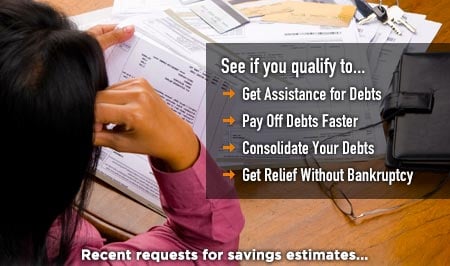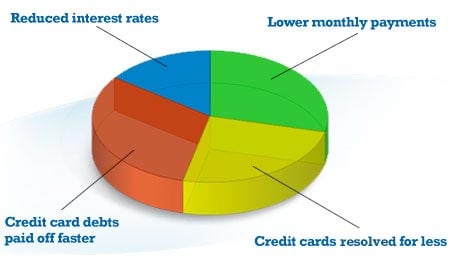
Debt Settlement
If you are struggling with high-interest credit card debts and falling several months behind on your payments and wondering how to settle these debts, you're not alone. Today, the tough economy has made life difficult for many residents in Arizona as well as across America, and many of them also struggle with their own debt crisis. The good news is, with the right debt relief program, you may be able to get help paying off your debts and get back on track to financial freedom.
One way to get relief is through a debt settlement program; with debt settlement, you can try and negotiate with creditors to pay a significantly reduced amount of your debts. This process typically involves saving up money for a lump sum amount that you can later on use to pay off your debts. Another debt relief method is debt consolidation, or credit counseling. What debt consolidation allows is for you to combine multiple credit card and unsecured debts into one, easier-to-manage and more structured payment made to a credit counseling agency.
These days, debt settlement and debt consolidation have become, for many consumers, popular alternatives to bankruptcy - which has a more damaging and longer lasting impact to one's personal credit. To find out if you qualify for debt relief, answer a few, simple questions and request your free debt relief analysis and savings estimate. It only takes minutes!
Pros and Cons of Debt Settlement
If your credit card debts have become truly unmanageable, debt settlement can be a viable debt relief option. As mentioned earlier, with debt settlement, you are hoping to settle or negotiate with your creditors for substantially less than what you originally owed. This is actually the main difference between settling your debts versus consolidating your debts through credit counseling - where you are paying the entire amount of your debts, just at lower interest rates. However, when considering debt settlement, keep in mind the risks :
As the term "debt settlement" implies, credit card companies are certainly not legally required to "settle" or accept your settlement proposal. In many cases, many consumers are advised to stop making payments on their credit cards to save up funds, over a period of time, that they can later use to make a reasonable settlement offer. While in the process of saving up funds and not making payments, one con of settlement is that many consumers may face the threat of a lawsuit from creditors for, essentially, defaulting on the terms of their credit card agreements. In addition, many consumers who default on the terms of their credit card agreements could typically see a decline in their credit rating; which is an important consideration for consumers whose credit was generally good prior to settling their debts.
Yet, despite the cons and risks involving one's credit, the pros of debt settlement make it a popular alternative to bankruptcy - which, as mentioned previously, can have a more serious and longer-lasting effect on your personal credit. To find out how debt settlement could help you, request a free debt relief analysis and savings estimate. Start here.
How Does Consolidation Work?
If you are an Arizona resident struggling with credit card debts, you may qualify for relief through a process known as debt consolidation, or what is sometimes referred to as a debt management plan (DMP). Debt consolidation typically involves "consolidating," or combining, your multiple, high-interest credit card debts into a single, more affordable monthly payment made to a credit counseling agency.
When you enroll in a debt consolidation program, credit counselors will go over your financial situation. When they determine a reasonable amount of money that you can use to pay off your debts, they will speak to your creditors, on your behalf, generally asking for a reduction of interest rates or the waiving of late fees and penalties. You can certainly talk to your creditors on your own, however, credit counselors generally specialize in coordinating a more affordable and more lenient payment plan for consumers like you who need help managing their debts.
Creditors that agree to the proposals are entered into the debt management plan. The goal is, as mentioned earlier, to provide consumers like you with one, more structured, and more manageable payment plan so that you can reduce your debts sooner than if you only continued to make the minimum payments at higher interest rates.
Compare Debt Relief Options
As previously mentioned, you have several options when it comes to getting debt relief and ultimately, regaining financial freedom. But before enrolling in any debt relief program, make sure to do your due diligence and take the time to understand how your debt relief options can affect your credit. Also, know your rights as a consumer. Remember, the Federal Trade Commission prohibits for-profit agencies that promote debt relief services, over the phone, to charge a fee before they settle, or reduce, a consumer's credit card or other unsecured debt. To find out more about consumers' rights, go to the FTC's homepage. If you are also experiencing other financial difficulties due to unemployment or a personal hardship, Arizona offers a variety of state-coordinated services that can help low-income residents obtain basic necessities. On its website, check out the Citizens Services page, which lists many of the services designed for people who need financial help, including assistance with food, employment, housing, or guidance on how to prevent foreclosure.
The bottom line is, if you are struggling with credit card and unsecured debts, there is help available - whether it's in the form of a debt consolidation program or debt settlement. Finding a reputable and experienced debt relief company is a smart first step towards paying off your debts and getting a new lease on life.
Find out how debt relief can help you by requesting a free debt relief analysis and savings estimate. Start now.























